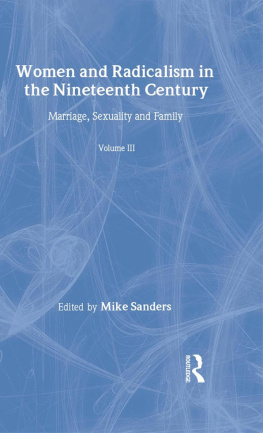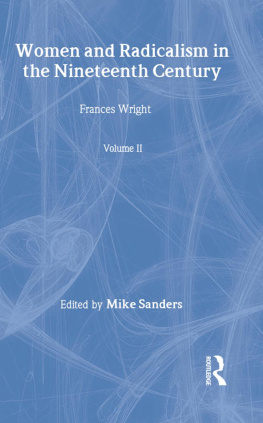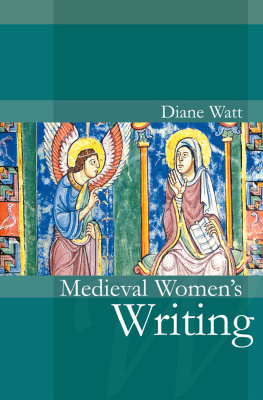First published 2000 by Ashgate Publishing
Published 2016 by Routledge
2 Park Square, Milton Park, Abingdon, Oxon OX14 4RN
711 Third Avenue, New York, NY 10017, USA
Routledge is an imprint of the Taylor & Francis Group, an informa business
Copyright Helen Rogers, 2000
The author has asserted her moral right under the Copyright, Designs and Patents Act, 1988, to be identified as the author of this work.
All rights reserved. No part of this book may be reprinted or reproduced or utilised in any form or by any electronic, mechanical, or other means, now known or hereafter invented, including photocopying and recording, or in any information storage or retrieval system, without permission in writings from the publishers.
Notice:
Product or corporate names may be trademarks or registered trademarks, and are used only for identification and explanation without intent to infringe.
British Library Cataloguing in Publication Data
Rogers, Helen.
Women and the People: Authority, Authorship and the Radical Tradition in Nineteenth-Century England.
1. Women in politicsEnglandHistory19th century. 2. RadicalismEnglandHistory19th century. 3. LiberalismEnglandHistory19th century. 4. FeminismEnglandHistory19th century.
I. Title.
305.4'2'0942'09034
Library of Congress Control Number: 00-105704
ISBN 13: 978-0-7546-0261-3 (hbk)
Friends, family and colleagues have given me invaluable support over the long gestation period of Women and the People. I am indebted to all those who chivvied me along and exchanged ideas. The 'subjects' of this book displayed a thirst for knowledge and a willingness to think outside conventional intellectual and political categories, and I trust I have not misrepre-sented their lives or their aspirations.
The research for this book began as a D.Phil. thesis at the University of York and was funded by a three-year studentship from the Economic and Social Research Council, for which I am very grateful. Joanna de Groot, Treva Broughton, Christopher Clark and Catherine Hall were enthusiastic and generous with their support and guidance. I hope that this book finally answers their questions.
In all the departments where I have studied, researched and taught, I have been lucky to find friendship and intellectual companionship. Thanks are due to my colleagues in the History Department and the Women's Studies Centre at the University of York; and the Department of Economic and Social History at the University of Exeter. Liverpool John Moores University provided me with a teaching fellowship which gave me time to reconceptualise the book; and my colleagues in the Department of Literature and Cultural History helped me refine my understanding of authorship and narrative, and wrestle with critical theory. All my friends kept my spirits up but, most especially, Berthold Schoene-Harwood kept me laughing at the end.
Various chapters were rehearsed in many places over the years. My interest was continually renewed by thoughtful contributions from participants in seminars and conferences at the universities of York, Exeter, Warwick, Essex, Uppsala, Gronigen, the Institute of Historical Research, the Leeds Centre for Victorian Studies, the Women's History Network, the History Workshop and the Radical Tradition. Librarians and archivists helped with the research wherever they could at the public libraries and record offices in Carlisle, Bolton, Nottingham; the Co-operative Union Library; Colindale Newspaper Library; the British Library; and especially the wonderful Local Studies Unit in the Manchester Central Library. David Doughan, at the Fawcett Library, London Guildhall University, helped me to comrlete the research on the repeal movement in record time.
My original interest in radical culture was inspired by Eileen Yeo and Peter Gurney at the University of Sussex, who continue to offer encouragement. Claire Eustance, Joseph Bristow, Ruth Symes, Alison Twells, Mary Hilson, Pam Morris, and Glenda Norquay commented constructively on draft chapters. Tim Ashplant demystified referencing conventions with his meticulous proof-reading, while his enthusiasm and interest fortified me through the final stages of drafting. Kathryn Gleadle shared her knowledge of the radical unitarians.
I am grateful for copyright permission to use material initially published by the following presses: Indiana University Press, "'The Good Are Not Always Powerful, Nor the Powerful Always Good": The Politics of Women's Needlework in Mid-Victorian London', Victorian Studies, 40.1 (1997), pp.589-623; Manchester University Press, '"The Prayer, the Passion and the Reason" of Eliza Sharples: Freethought, Women's Rights and Republic anism, 1832-1852', in Eileen Janes Yeo (ed.), Radical Femininity: Womens Self-Representation in the Public Sphere (Manchester: Manchester University Press, 1998), pp.52-78; and Edinburgh University Press, 'From "Monster Meetings" to "Fire-side Virtues"? Radical Women and "the People" in the 1840s', Journal of Victorian Culture, 4.1 (1999), pp.52-75. The perceptive comments from editors and readers helped me to bring into focus the themes developed in Women and the People and taught me a great deal about writing. My appreciation goes especially to Andrew Miller, David Schroeder and Julia Swindells at Victorian Studies; Martin Hewitt and Peter Mandler from the Journal of Victorian Studies; Eileen Yeo and fellow contributors to Radical Femininity. Erika Gaffney at Ashgate could not have been a more attentive editor. Owain Hammonds completed the typescript with alacrity and precision.
Jane Rendall has been involved with this book since its inception and her insightful reading of the draft manuscript helped me bring it to completion. I will always benefit from, and be inspired by, her intellectual generosity. My thanks go most of all to Jo Melling, an exacting and creative critic, who dared me to rethink the book and to enjoy the challenge.
In her essay on the 'Enfranchisement of Women', published in the Westminster Review in 1851, Harriet Taylor identified the political claims of women with the pursuit of popular rights by the liberal, democratic movements within English politics. By doing so, she laid claim to a radical political tradition. Women and the People investigates the attempts of women to appropriate and make use of that tradition, both as individual reformers and as organised bodies of women. Yet, as Taylor argued, radical politics rarely spoke directly to women as political subjects in their own right. 'In England', she regretted, 'the wife's influence is usually on the illiberal and anti-popular side: this is generally the gaining side for personal interest and vanity; and what to her is the democracy or liberalism in which she has no part - which leaves her the Pariah it found her?' If, as Taylor asserted, radical politics generally ignored the interests and opinions of women, why did so many seek to intervene in the radical movements? By exploring women's identification with a variety of radical causes in the nineteenth century, Women and the People assesses the attractions and the limitations of radicalism for women, and considers how they reshaped the meanings and practices of the radical tradition as they struggled to make it their own.








